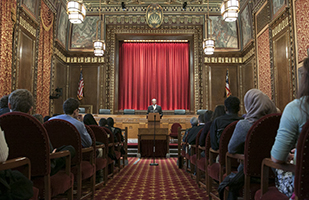Freedom at Heart of Black History Month Speech

Freedom comes with responsibility, said Dr. Clarence Newsome at the Ohio Supreme Court’s Black History Month celebration on Monday.

Freedom comes with responsibility, said Dr. Clarence Newsome at the Ohio Supreme Court’s Black History Month celebration on Monday.
Oney Judge, a slave in the household of George and Martha Washington, was born at Mount Vernon and taken to Philadelphia where the Washingtons lived as the country’s first president and first lady. During President Washington’s second term, the young Judge fled her enslavement, escaping to New Hampshire.
Many years later, when Judge was an elderly woman, a journalist compared her poverty and struggles while living free with the comforts she had as one of the Washington slaves, and asked her if she would still flee if she could do it over again. She responded that she would because she felt she was made a child of God by becoming free.
The story resonated with Clarence G. Newsome, president of the National Underground Railroad Freedom Center and speaker for the Ohio Supreme Court’s Black History Month celebration on Monday. Newsome, who has a doctorate in American religious history and a master’s in divinity, said this view of freedom as created by a higher power reflects the moral grounding of the concept.
“There is a right way to live together,” he said. “There is a right way to craft laws that allow for us to live to our fullest potential without doing harm to one another.”
Freedom is bounded. It is not boundless.”
- Dr. Clarence G. Newsome, National Underground Railroad Freedom Center
Freedom is bounded. It is not boundless.”
- Dr. Clarence G. Newsome, National Underground Railroad Freedom Center
Newsome described the rule of law as a code developed by human beings that applies to all people equally and said we have to find ways to live together civilly. Looking to the Courtroom’s ornate ceiling with large paintings depicting the five states in the Northwest Territory of the late 1700s, Newsome noted that the region was to join the United States as a free territory, one that didn’t legally permit slavery. The Courtroom symbolizes the great debates taking place at the time about the nature of freedom and the ideal of America, he said.
Newsome stressed to the audience, comprised of nearly 120 students from three Columbus high schools, Supreme Court employees, and the public, that freedom comes with responsibility.
“Because we can do something freely doesn’t mean it’s the right thing to do,” he pointed out. “Freedom is bounded. It is not boundless.”
It requires self-discipline and a self-governing capacity, he said.
“That’s where this sense of a moral compass … becomes a very powerful force for social growth and social transformation.”
Frequently addressing the students, Newsome said it would be the “worst thing” if the youth were apathetic or disengaged, and he urged the “responsible exercise of rights and privileges.” As starting points, he mentioned student government and civic activities in local communities.
“There are plenty of places for you to find your spot and your way to make freedom the reality that it was intended to be,” he said.
Newsome, director of the Freedom Center since 2013, is known for his academic work in African American history and culture, as well as religious history. A triple alumnus of Duke University, Newsome has served as president of Shaw University, dean of the Howard University School of Divinity, member and past president of the Society for the Study of Black Religion, member of the White House Advisory Group on Historically Black Colleges and Universities, and board member of the United Negro College Fund.
Video of the speech is available to watch on the Ohio Channel.


